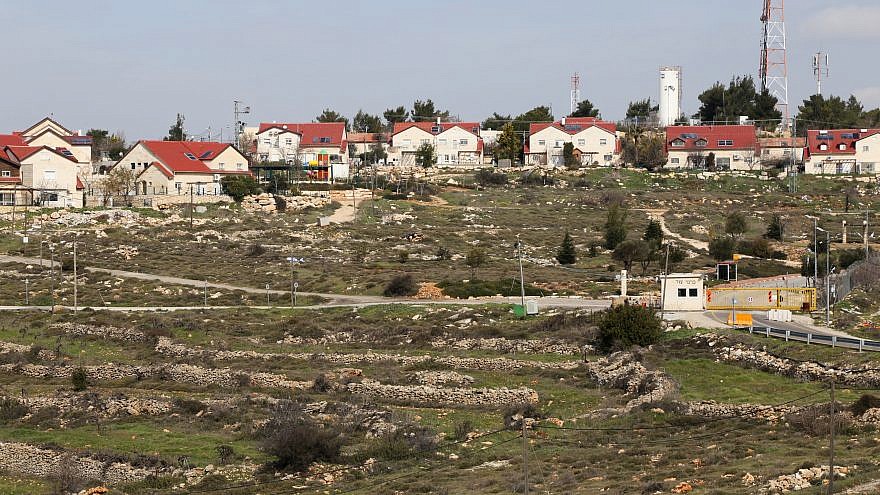While Israelis are struggling to form a government as the result of a virtual tie between Blue and White and Likud, Americans for Peace Now has weighed in with a pamphlet that asks what politicians can do to move things forward.
But in reality, the perspective of the pamphlet seems out of date, and dreams of what on the ground seems unreasonable.
It begins with advocacy of a two-state solution, an opposition to the Trump administration, and pretty much an advocacy of what Palestinians have been dreaming about for years.
It includes a strong opposition to Israeli occupation of anything over the Green Line of the pre-1967 borders, supports a division of Jerusalem between Israeli and Palestinian capitals, plus a boycott directed against Israeli products from the West Bank, a considerable return of Israelis from the territories to Israel, and a limited return of Palestinian refugees to Israel.
Also involved is a settlement of the conflict between Palestinians in control of the West Bank with those in control of Gaza, as well as a settlement of conflicts with Iran over its nuclear program.
But Iran has ties with parts of the multi-faceted Palestinians. It’s part of what’s happening, and what is likely to mess up any effort to focus entirely on Palestine and Israel, and turn back the clock by 50 years.
Turkey, ISIS, and Syria are also wild cards with their fingers in the Palestinian pie.
Meanwhile, where it’s happening, Bibi is holding on to power with his fingernails, and describing any cooperation with the Arabs of Israel as a fatal flaw of what he calls the country’s leftists.
The gap between Americans for Peace Now and Bibi is huge. And the gap between Americans for Peace Now and the bulk of Israelis seems almost as great.
While Bibi comes across as an abject racist, he is playing on a reality that makes Israelis wonder about Arab intentions.
On the one hand is considerable integration of Arabs in the Israeli society and economy. On the other hand is considerable affinity between those Arabs and Palestinians. And the mess of Palestinian ideologies and politics is something that resists any simply application of a two-state solution with all its increments.
On the positive side are more than 100,000 Palestinians, including some 5,000 from Gaza, who work in Israel. On the negative side is the reality that some of those, and others, are inclined to violence.
How many killings, attacks, and frustrated Palestinian/Israeli Arab plans can an Israeli accept and still sign on to the proposals of the Americans for Peace Now?
What we have been seeing here is the preoccupation of Benjamin Netanyahu with his own perpetuation in office, and staying away from a trial and the prospects of jail.
He plays the anti-Palestinian card to strengthen himself, and undoubtedly adds to the popular distrust of our neighbors.
Against him is Blue and White. As far as we can tell, it does not differ greatly from Likud on major issues, except for its opposition to Bibi.
Both major parties, as well as much else in the Israeli electorate, is far removed from the perspective of Americans for Peace Now. Most settlements in the West Bank have been where they are for years, and Americans for Peace Now’s estimate of 30,000 settlers having to be moved back to Israel sounds so foreign to be unrealistic.
Like Palestinian politicians, Americans for Peace Now’s concern to erase the most recent half-century of history is a dream. And trying to sell it to politicians is folly.
What to do instead?
First Israelis have to deal with Bibi.
Then Israelis have to wait for the Palestinians to put their own house in order. Signs are that a majority oppose the present government of Mahmoud Abbas, who according to Palestinian law should have left office a decade ago. And it appears from Palestinian opinion polling that a majority of East Jerusalem Palestinians prefer life under Israel as opposed to becoming fully Palestinian.
And while Americans for Peace Now condemns Israel’s treatment of its Arab citizens, their situation appears no worse and in many respect better than those of America’s Black and Hispanic minorities.
What’s in the cards?
Perhaps something not too much different from current realities, which feature considerable autonomy for Gaza and West Bank Palestinians, subject to Israeli efforts to protect itself.
Details are not likely to come from Americans or others, and especially not from those who want to turn back history.
More recently Israel has been involved with warfare with one of the Palestinian factions of Gaza. This turmoil began with the killing of a Jihad Islamic leader, and then came the responses of what has amounted to some 450 rocket attacks against Israel, with targets in Tel Aviv and the south. Israel’s responses have managed to kill some 25 Jihad fighters most of them caught while trying to send rockets onward.
The timing of the initial killing seems at least partly political. It damaged the prospect of Benny Gantz forming a minority government with the support of the Arab List.
Israel’s counter attacks have been directed mainly against Jihad, which is as close as an Iranian ally as can be found among the Palestinians.. Hamas, the nominal ruler of Gaza, has remained quiet. A split between Hamas and Jihad is one of the factors that complicates Palestinian life, and gets in the way of what Americans for Peace Now are dreaming about.
Palestinians are far from being united, to the point of being unable to involve themselves in serious efforts at negotiation.
Republished from San Diego Jewish World


























